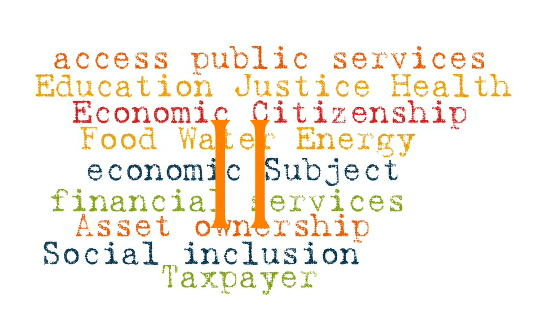
Following the discussion outlined in the first part of this article, we propose here some reflections that elaborate further on the idea of the citizen as an informed economic agent. An agent who takes decisions to solve the choice and optimization problems she faces on her daily affairs. Such situations do not emerge without obstacles -and as we see in our advanced societies-, very often become insurmountable barriers originating social exclusion and poverty and preventing the individual’s progress towards the completion of his full citizenship.
The capacity of the economic citizenship entails economic independence and security built upon the contributions of “real” jobs and wages, home ownership and affordable leases, health services, education, justice, decent pensions and retirement relief. All these are attributes that a modern democratic state, has the duty to protect and stimulate under the rule of law.
The other side of the coin are the negative externalities, such as poor working conditions, environmental damages, education flaws, or the violation of human rights. These are factors leading to poverty and social exclusion that impede the harmonious development of the economic citizen. Neglecting policy actions to mitigate such externalities would entail the granting to populist and totalitarian regimes, of the staple food that nourishes their reason to exist. For these regimes the ideal of inclusion and wellbeing of the citizen as an economic agent that reaches her status through hard and decent work, with equitable laws and fair taxation, does not fit into their agendas. On the contrary, their political action is based on the permanent alienation of the individual, thus eliminating their basic freedoms and keeping the statu quo of a citizenship «hostage» of the government; a second-class citizen that in exchange for false and delusive promises, surrenders the most precious of all human beings: their freedom to be and exist.
Education, considered as an investment not expenditure, sustainable in the long term and whose objectives are shared and promoted by the civil society and public authorities, will be the lever that fosters the development of the economic citizen condition that we advocate. Within education, the component of financial literacy should be a curricular constituent from the primary school up to university level. Financial literacy should enhance the capabilities of the individual as homo oeconomicus by advising him through the intricacies of choosing and optimizing his finance related decisions that influence the accrual of economic security and wellbeing throughout his life. A citizen reasonably educated in the economic and finance space, tends to undertake better decisions in the allocation of financial resources such as savings, investments or loans.
The lack of economic and financial education often leads the individual to ignore the value of money, savings, the meaning of financial risks…that ultimately converge into sources of legitimate social unrest arising from situations of bankruptcy (losses of savings, employment, the company, property evictions) and its derivative to the point to «other’s» fault: criminal bankers, dependent judges, corrupt politicians or racketeers.
Let’s then invest into the foundations that strengthen the individual wellbeing and enable the society to be increasingly more inclusive, richer and freer. With this in mind our societies shall be better empowered to promote the full economic citizenship as an agent of social integration, justice, liberty and democratic political participation.
Quotes:
Economics brings into view that conflict of choice is one of the permanent characteristics of human existence. Lionel Robbins, Baron Robbins.
No society can surely be flourishing and happy, of which the far greater part of the members are poor and miserable. Adam Smith.
The most valuable of all capital is that invested in human beings. Alfred Marshall.
![]() Economic citizenship, a disruptive note II by Miguel Sánchez de Pedro is licensed under a Creative Commons Attribution-NoDerivatives 4.0 International License.
Economic citizenship, a disruptive note II by Miguel Sánchez de Pedro is licensed under a Creative Commons Attribution-NoDerivatives 4.0 International License.


